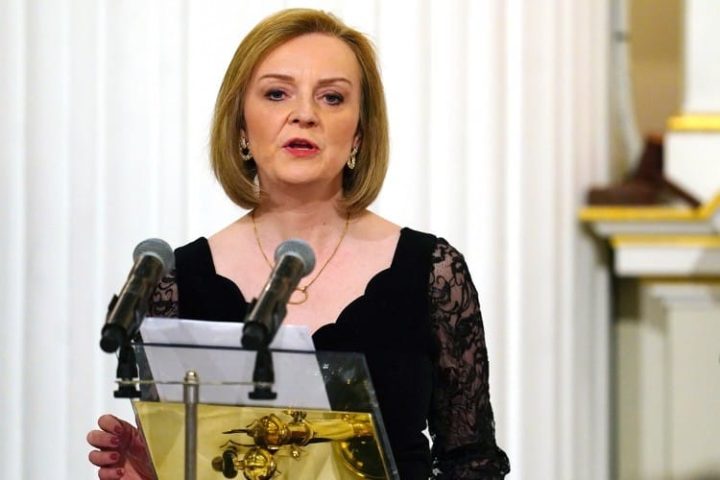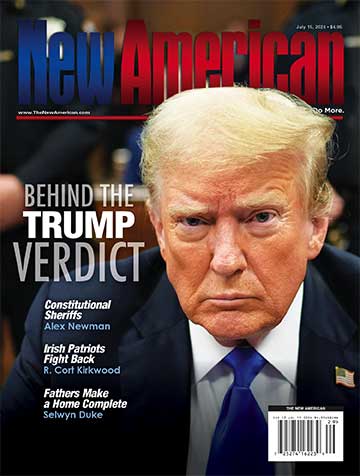
Former U.K. Prime Minister Liz Truss recently cautioned that the ascendence of Communist China is a “threat” to the “free world,” and called for more military alliances and economic solidarity to fend off its clout.
“The free world is in danger,” Truss said in a speech to her audience — legislators from the Inter-Parliamentary Alliance on China — in the Japanese capital of Tokyo, in comments cited by The Times.
“President Xi [Jinping] has been very clear — it’s his ambition for China to have control of Taiwan and in my view this would be disastrous,” she said of the Chinese authoritarian leader.
“We must ensure that Taiwan is able to defend itself, and we must work together across the free world to do this…. I would like to see a more developed Pacific defense alliance alongside even closer cooperation between NATO and our Pacific allies,” she continued, further suggesting that “the G7 plus its allies act as an economic NATO” to stop China’s communist regime flexing its economic muscle to pressure other states into acceding to its demands.
“We could move to an economic Article 5, where the ‘one for all, all for one’ principle is wielded in defense of our values,” she proposed, alluding to Article 5 of NATO, which stipulates, in theory, that if one alliance member is attacked, all other members are obliged to defend it.
However, conservatives worry that Truss’ suggestions could also be used against individual countries hoping to shield local jobs against the negative effects of globalization, or against countries with national conservative governments that do not gel with the European Union (EU) left-leaning mainstream narrative, such as predominantly Catholic Hungary and Poland.
Truss’s bellicose approach to China can be juxtaposed with that of her successor, incumbent Prime Minister Rishi Sunak.
Sunak, though dismissed by the Conservative Party grassroots when he contested Truss for the party leadership and premiership, was put into power shortly after Truss’ resignation.
That being said, Sunak had the notorious reputation of being the candidate preferred by the Chinese regime, with the Chinese state-run Global Times lauding him as “the one candidate with a pragmatic view of developing balanced ties with China.”
Although Sunak made some seemingly hard-line statements about China before becoming prime minister, his tough talk toward China has subsided now that he is in power.
Besides, other figures within the Conservative Party, including former leader David Cameron, have been criticized for having business relations with China.
Also, former Labour leader Tony Blair, a participant at this year’s globalist World Economic Forum (WEF) in Davos, is known to have made £237,000 for one speech in the Chinese industrial city of Dongguan right after leaving office — a figure that exceeds the prime minister’s annual salary.
Truss is not the only one calling for alliances to counter China. In Asia, the Philippines also began talks with the United States and Australia over potential joint maritime patrols in the contested South China Sea region to deal with Beijing’s rising pugilism.
Australian Deputy Prime Minister Richard Marles — who also acts as defense minister — met with Philippine Defense Secretary Carlito Galvez in Manila recently to discuss enhancing bilateral defense ties.
Marles revealed that both sides agreed to explore ways to stage “joint patrols together in the South China Sea” and conduct “more exercises together.”
Both nations are “deeply invested” in maintaining the UN Convention on the Law of the Sea, which categorizes maritime areas within 200 nautical miles of coastal nations’ borders as part of their exclusive economic zones.
Marles pointed out the importance of upholding a rules-based order in the South China Sea, as most of Australia’s maritime trade goes through that region as well.
“As countries which are committed to the global rules-based order, it is natural that we should think about ways in which we can cooperate in this respect,” he said during a joint press conference.
“And so we did talk today about the possibility of exploring joint patrols, and we will continue that work, and we hope that that comes to fruition soon.”
Australia will deploy “one of its largest contingents” to participate in the U.S.–Philippine annual joint military exercise, while the Philippines will send its observers to join Exercise Talisman Sabre — a multinational military drill led by Australia and the United States, Marles said.
Galvez disclosed that Australia and the Philippines had hitherto staged joint patrols, especially in the Celebes and the Sulu Seas.
“We have the experience, and we can redo it again,” he said.
Before the meeting, Galvez spoke by phone with U.S. Defense Secretary Lloyd Austin to discuss rebooting joint maritime activities in the South China Sea.
Both Galvez and Austin talked about “concerning developments” in the South China Sea, including a February 6 episode in which a Chinese Coast Guard ship directed a military-grade laser at a Philippine coast guard vessel, according to Pentagon reports.
The Philippine vessel was aiding a navy resupply mission in Ayungin Shoal, also called the Second Thomas Shoal, of the Spratly Islands when the Chinese ship beamed a green laser light at it, temporarily blinding the crew onboard.
Austin reiterated that any armed attack on Philippine armed forces, public vessels, or aircraft would entail U.S. mutual defense obligations.
He stressed American commitment to boosting the Philippines’ defense capabilities and capacity “to resist coercion.”
To boot, both leaders also discussed opportunities to shore up security cooperation “with like-minded nations, such as Japan, that seek to uphold the rules-based international order,” the Pentagon said.
U.S.-Philippine joint patrols were suspended in 2016 by former Philippine President Rodrigo Duterte, who tried to boost relations with Beijing. His successor, Ferdinand Marcos Jr., has promised to bolster ties with the United States, which he termed “a Pacific power.”
During his meeting with Austin on February 2 this year, Marcos said “the Asia-Pacific region has become a terribly complicated situation,” which his nation can only navigate “with the help of our partners and our allies.”
On February 17, the Philippine Coast Guard (PCG) said that it mobilized its largest vessel, the BRP Teresa Magbanua, following Marcos’ command to ramp up Philippine maritime operations and presence in the South China Sea.
The PCG previously deployed the vessel on February 2 in the Kalayaan Island Group, which is part of the Spratly archipelago, and advised Filipino fishermen to radio PCG or the Philippine armed forces if they needed any help.
Beijing currently claims most of the South China Sea as its own territory under its so-called nine-dash line. Although a verdict by the Hague Tribunal supported legal action taken by the Philippines in 2016, the Chinese regime has refused to acknowledge the outcome, with Chinese vessels continuing to trespass into the Philippines’ maritime zones.



